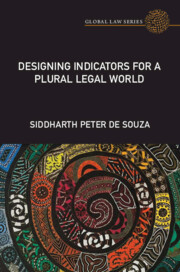Book contents
- Frontmatter
- Dedication
- Contents
- Acknowledgements
- 1 Introduction
- 2 ‘Meanings’, ‘Trust’ and ‘Power’: Critical Perspectives on Legal Indicators
- 3 Rule of Law Promotion, Legal Indicators and Legal Pluralism
- 4 Epistemic Diversity and Voices from the Global South: Countering the Managerial Implications Of Measuring Justice
- 5 A Capability Approach to Access to Justice in Plural Legal Systems
- 6 Conclusion
- Appendix
- Bibliography
- Index
4 - Epistemic Diversity and Voices from the Global South: Countering the Managerial Implications Of Measuring Justice
Published online by Cambridge University Press: 29 July 2022
- Frontmatter
- Dedication
- Contents
- Acknowledgements
- 1 Introduction
- 2 ‘Meanings’, ‘Trust’ and ‘Power’: Critical Perspectives on Legal Indicators
- 3 Rule of Law Promotion, Legal Indicators and Legal Pluralism
- 4 Epistemic Diversity and Voices from the Global South: Countering the Managerial Implications Of Measuring Justice
- 5 A Capability Approach to Access to Justice in Plural Legal Systems
- 6 Conclusion
- Appendix
- Bibliography
- Index
Summary
The development of legal indicators is a function of many decisions that in turn contribute to the epistemological power of these quantification tools. These decisions include the choices of theoretical concepts and methodologies employed in order to develop indicators, the locations from where the knowledge is constructed and from where it is extracted, the purposes for which the indicators are developed and the desired impact they are meant to achieve. These decisions influence the development of indicators and impact how they function. Through these different choices and decisions, indicators are built with a particular point of view and, as a result, while they can tell stories and convey a particular reading of the world, they also simplify and reduce complexity, create silences and engineer absences in understanding the world.
This chapter is concerned with offering a framework to embed an epistemic plurality and diversity into how we can build and develop legal indicators. It does so by engaging with epistemologies of the Global South and with embedding the realities of legal pluralism in the making of indicator frameworks. It explores how indicator frameworks can pay attention to the way in which concepts and values are represented while also engaging with different experiences and realizations of justice as they materialize in people's lives.
An important starting point for this chapter is an acknowledgment of the ubiquity of quantification. In the next section, I provide an overview of how we live in a quantified society and that legal indicators, like other indicators, have become pervasive in their use in public discourse, government functioning, international business and development cooperation. Acknowledging the pervasiveness of quantification, however, does not mean that the practice of quantification cannot be done differently. In the ensuing section, I will introduce the idea of ‘persistence’ as a strategy to address some of the challenges posed by the critiques and argue that through persistence, steps can be taken to make the process of development and construction of indicators more open and transparent. The aim of this chapter is to address some of the critiques of legal indicators by offering an epistemological perspective, particularly by drawing from legal pluralism and through concepts from the South. It is an attempt to directly address the silences and absences in the current framing of legal indicators.
- Type
- Chapter
- Information
- Designing Indicators for a Plural Legal World , pp. 112 - 163Publisher: Cambridge University PressPrint publication year: 2022
- 2
- Cited by



